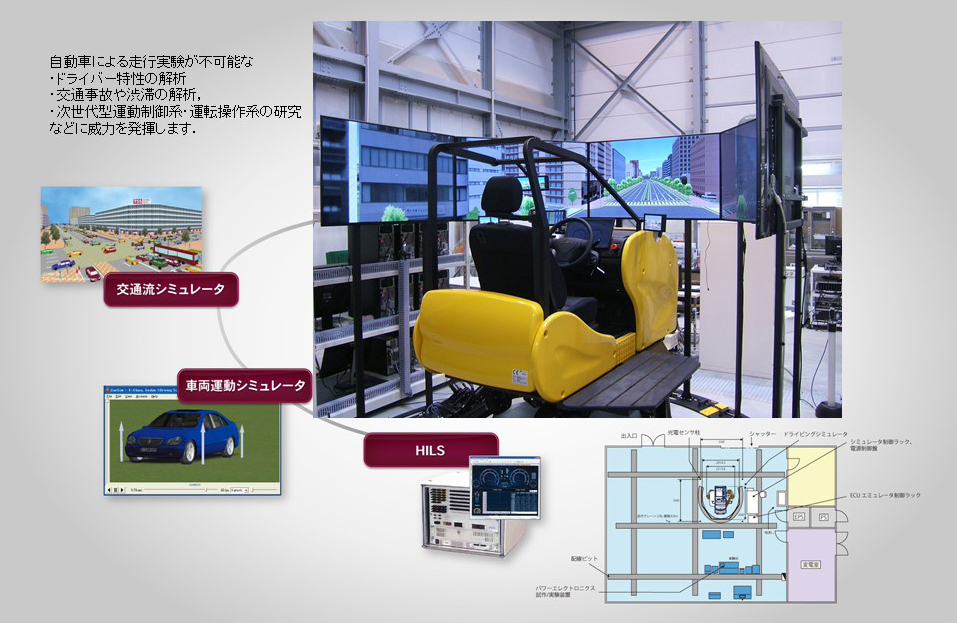Information and Control Field
Toward the realization of the next-generation intelligent vehicles
Research Contents
In the Information and Control Field, professor and students are to study fundamental technologies and development methodologies for realizing automotive control and information technology. Automotive components used to be controlled separately and are now controlled systematically. Hereafter, cars and infrastructures will be communicated with each other and will be controlled for higher safety, comfort and environmental performance. Energy and power sources for automobiles will become diversified and new control methods will be required for them. The Information and Control Field brings up human resources who have knowledge on and are capable of developing automotive control IT systems.
An information-driven simulation system among humans, cars, and traffic flows

Automotive motion control
Information systems(e.g. communication devices, sensor systems and etc.), manipulation systems(brake system and steering system) and powertrain systems(e.g. combustion engine, electric motor, transmission and etc.) are linked by an on-board network equipped in today’s automobile. Control methodologies to achieve high level safe/ecological driving optimizing the functions of the networked automobile are researched.
Advanced onboard sensing system
To achieve intelligent driving, advanced sensing technology is required. Our research focuses on monitoring surrounding environment of vehicle and occupant condition sensing using semiconductor technology.
Automotive Application by Superconducting Technology
Superconducting technology has an advantage where we can transport an electric current at more than 100 times higher current density than the case with conventional one without losses, and has been expected in the automotive field for (i) application to motors for electric vehicles, (ii) application to wireless charging system, and (iii) synergy effects with hydrogen infrastructure which is crucial for the popularization of fuel-cell cars. Basic and applied superconducting technology for them is widely developed in this laboratory.
Teaching Staff
| Faculty Members | Lab Location | Graduate Faculty | Education and Research Area |
|---|---|---|---|
| Prof. Masaki Hirota | Ito Campus | Faculty of Engineering | Automoitive sensor, Functional materials and device |
| Prof. Masahito Shoyama | Ito Campus | Faculty of Information Science and Electrical Engineering | Electronic circuit, Power electronics, Switching power supplies, EMC engineering |
| Assoc. Prof. Kohei Higashikawa | Ito Campus | Faculty of Information Science and Electrical Engineering | Superconducting system, Measurement and control engineering |
| Assoc. Prof. Takatsugu Ono | Ito Campus | Faculty of Information Science and Electrical Engineering | System architecture,Hardware security |
| Assoc. Prof. Tsunenori Mine | Ito Campus | Faculty of Information Science and Electrical Engineering | Materials physics and chemistry, functional nanomaterials |